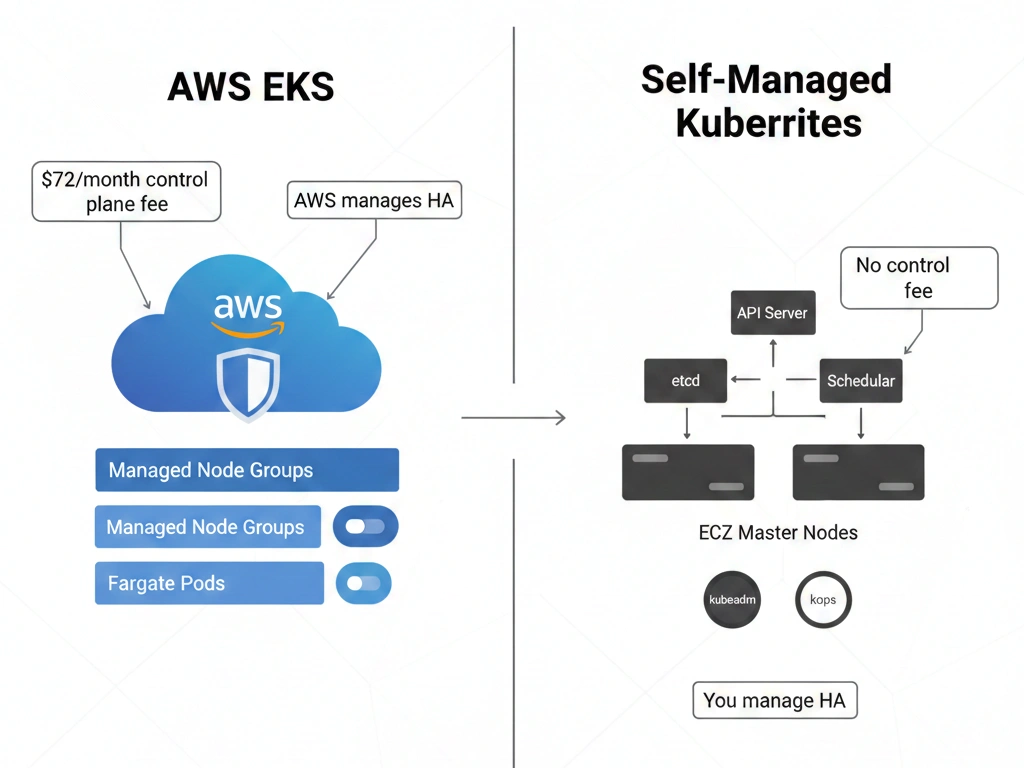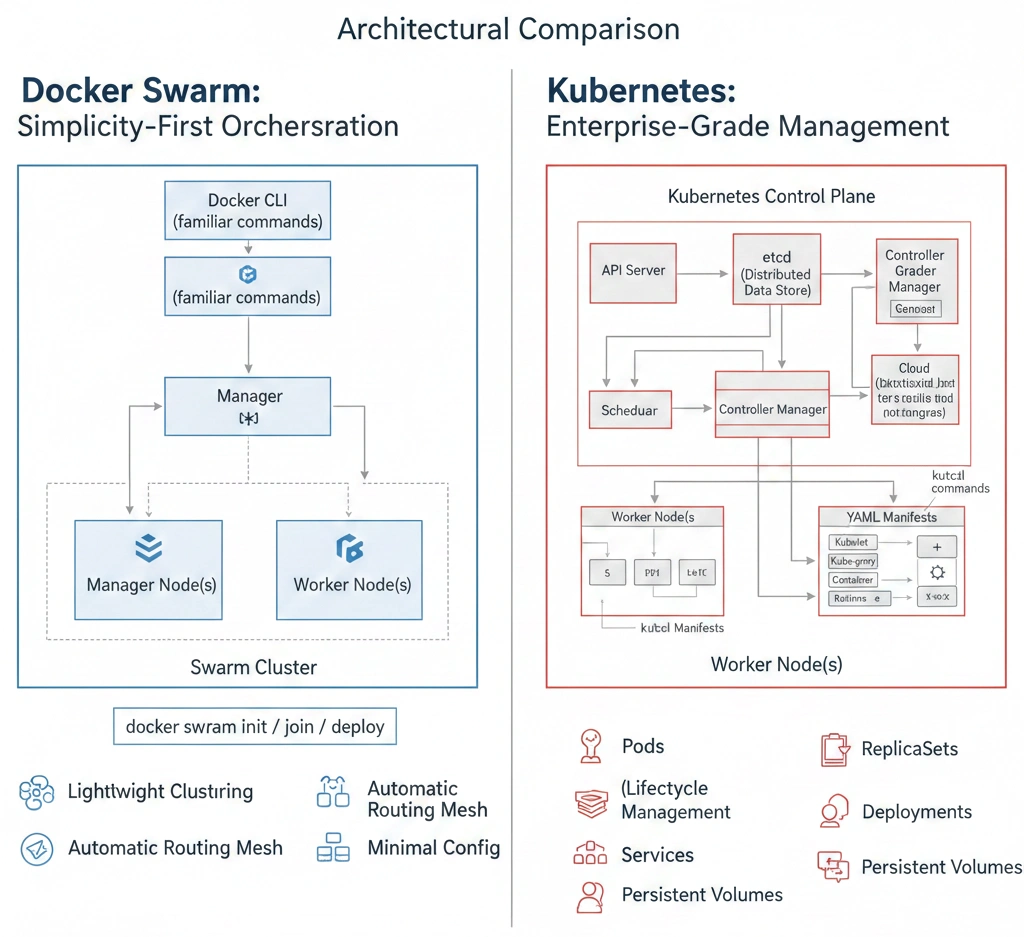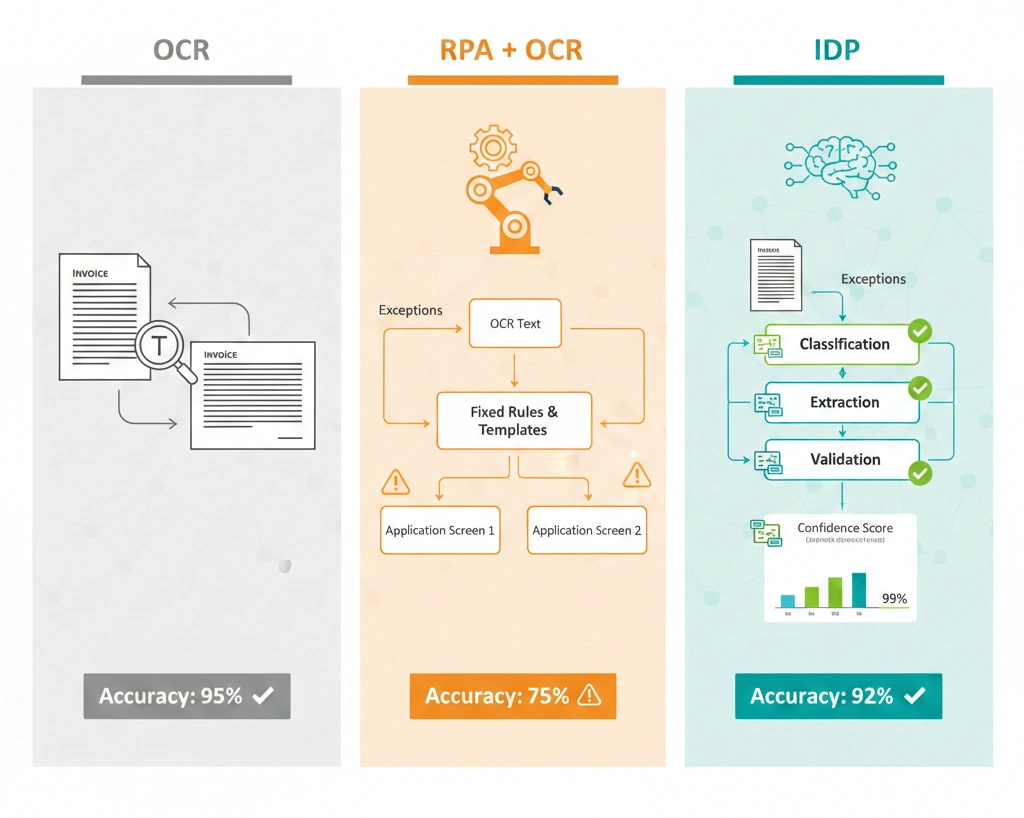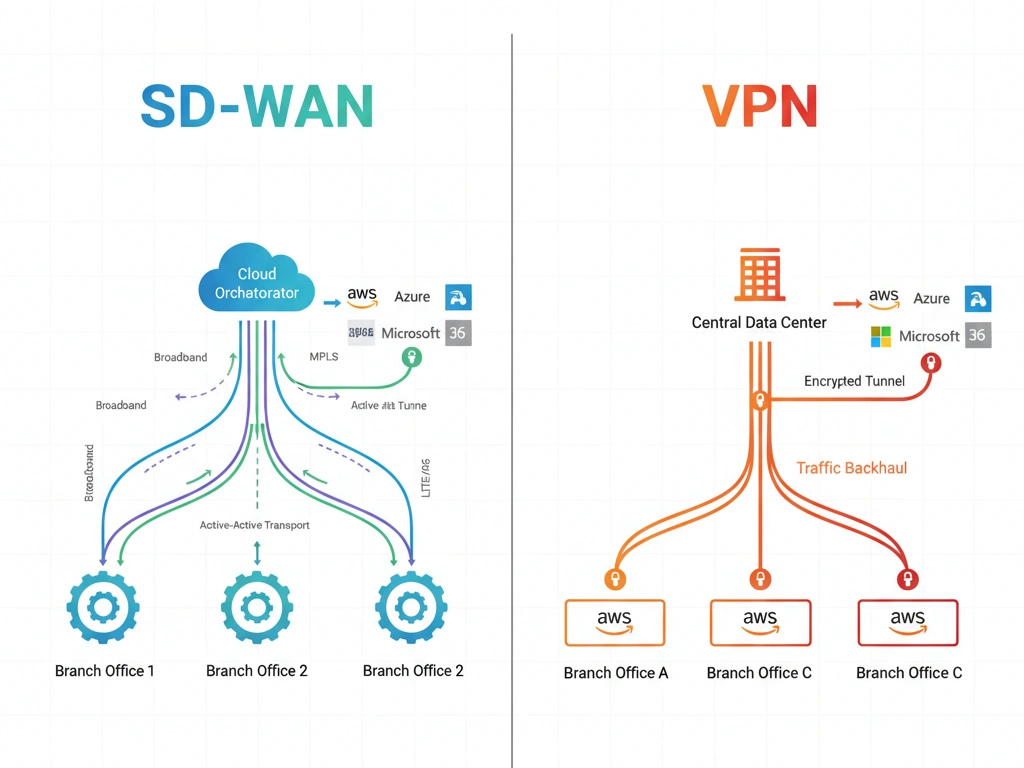In the landscape of computational complexity theory, few concepts generate more confusion and debate than NP-Hard and NP-Complete problems. These classifications represent fundamental boundaries in computer science, defining what we can realistically compute and what remains computationally intractable despite advances in hardware and algorithms. For computer science students mastering theoretical foundations, software developers optimizing real-world systems, and algorithm researchers pushing computational boundaries, understanding NP-Hard vs NP-Complete distinctions is essential for recognizing inherent problem difficulty and selecting appropriate solution strategies. This comprehensive guide demystifies these complexity classes through clear definitions, practical examples, and real-world implications that bridge theory with application.
Table of Contents
Introduction to Computational Complexity
In computer science, understanding algorithm complexity is crucial — and few topics spark more confusion than NP-Hard vs NP-Complete. These terms define how difficult a problem is to solve or verify using computational methods. In this comprehensive guide, we’ll explore what sets NP-Hard problems apart from NP-Complete ones, break down their definitions with clear examples, and explain why recognizing the difference matters when designing and optimizing algorithms.
Whether you’re a computer science student, software developer, or algorithm enthusiast, mastering these concepts will help you better understand computational complexity theory and make informed decisions about problem-solving approaches.

Key Differences: NP-Hard vs NP-Complete
Core Distinction
The fundamental difference: NP-Complete problems must be in NP and NP-Hard, while NP-Hard problems only need to be at least as hard as NP problems but don’t have to be in NP themselves. This means all NP-Complete problems are NP-Hard, but not all NP-Hard problems are NP-Complete.
Aspect | NP-Hard | NP-Complete |
|---|---|---|
| Definition | The class of problems to which all problems in NP can be reduced in polynomial time by a deterministic Turing machine | The class of decision problems in NP to which all problems in NP can be reduced in polynomial time by a deterministic Turing machine |
| Relationship to NP | NP-Hard ⊄ NP (not necessarily in NP); NP ⊄ NP-Hard | NP-Complete ⊂ NP (always in NP) |
| Subset Relationship | Not all NP-Hard problems are NP-Complete. For an NP-Hard problem to be NP-Complete, it must be in NP | All NP-Complete problems are NP-Hard |
| Verification Time | No requirement for polynomial-time verification of solutions | Solutions must be verifiable in polynomial time (this is what makes it “in NP”) |
| Problem Type | Can be decision problems, optimization problems, or other problem types | Typically decision problems (yes/no questions) |
| Hardness Criteria | At least as hard as the hardest problems in NP; can be even harder | Exactly as hard as the hardest problems in NP (no harder, no easier) |
| Classification Requirement | Any problem in NP can be reduced to it in polynomial time | Any problem in NP can be reduced to it in polynomial time AND it must be in NP itself |
| Example Characteristic | Problems that are at least as hard as NP-Complete problems but may not be in NP; not limited to decision problems | Represents the set of all problems in NP for which any other NP problem can be reduced to it in polynomial time |
| Solvability in P | If P = NP, some NP-Hard problems still wouldn’t be in P (those outside NP) | If P = NP, all NP-Complete problems would be in P |
| Practical Implication | May require exponential time or be undecidable; no verification guarantee | No known polynomial-time solution, but solutions can be quickly verified once found |
Understanding NP-Hard Problems
Definition
NP-Hard problems rank among the most challenging computational problems we face. What defines them is a simple yet powerful characteristic: they are at least as difficult as the hardest problems in the NP complexity class. The term “hard” here has a precise technical meaning — it indicates that if you could solve an NP-Hard problem in polynomial time, you could also solve every problem in NP in polynomial time. This makes NP-Hard problems the computational ceiling of difficulty for a broad class of problems.
Key Characteristics of NP-Hard Problems
Defining Properties
- Reduction Property: Every problem in NP can be reduced to an NP-Hard problem in polynomial time using a many-one reduction
- Not Necessarily in NP: Unlike NP-Complete problems, NP-Hard problems don’t need to belong to the NP class
- No Verification Requirement: There’s no requirement that solutions can be verified in polynomial time
- Broader Problem Types: Can include optimization problems, counting problems, and function problems — not just decision problems
Important Implications
- Computational Intractability: NP-Hard problems are considered computationally intractable for large inputs
- No Polynomial Algorithm Known: No known polynomial-time algorithm exists for any NP-Hard problem
- May Be Undecidable: Some NP-Hard problems (like the Halting Problem) are provably undecidable
- Practical Approximations: Often require approximation algorithms or heuristics for practical solutions
Why NP-Hard Matters:
This flexibility makes NP-Hard a broader category that encompasses problems that might be even harder than those in NP. When you encounter an NP-Hard problem in practice, you immediately know that finding an optimal solution in reasonable time is likely impossible for large instances. This recognition guides developers toward approximation algorithms, heuristics, or accepting solutions that are “good enough” rather than optimal.
Understanding NP-Complete Problems
Definition
NP-Complete problems occupy a special position in computational complexity theory. They represent the “hardest” problems within the NP class, meaning they are both in NP and as difficult as any problem in NP. The “complete” in NP-Complete indicates that these problems are complete with respect to polynomial-time reductions — every problem in NP can be transformed into an NP-Complete problem. This property makes NP-Complete problems the linchpin of the famous P vs NP question.
Key Characteristics of NP-Complete Problems
Defining Properties
- Membership in NP: Solutions can be verified in polynomial time by a non-deterministic Turing machine
- Universal Reducibility: Every problem in NP can be transformed into an NP-Complete problem using a polynomial-time reduction
- Decision Problems: Typically framed as yes/no questions with verifiable answers
- Interconnected Nature: If one NP-Complete problem can be solved in polynomial time, all can be solved in polynomial time
Critical Properties
- P vs NP Connection: Central to determining whether P = NP
- Polynomial Verification: Given a solution, you can verify it’s correct in polynomial time
- No Known Polynomial Solution: No polynomial-time algorithm known despite decades of research
- Equivalent Difficulty: All NP-Complete problems are essentially equivalent in difficulty
The Million Dollar Question
This interconnectedness makes NP-Complete problems central to the famous P vs NP question in computer science. If anyone proves that even one NP-Complete problem has a polynomial-time solution, they would simultaneously prove P = NP and win the $1 million Millennium Prize from the Clay Mathematics Institute. Conversely, proving any NP-Complete problem requires exponential time would prove P ≠ NP.
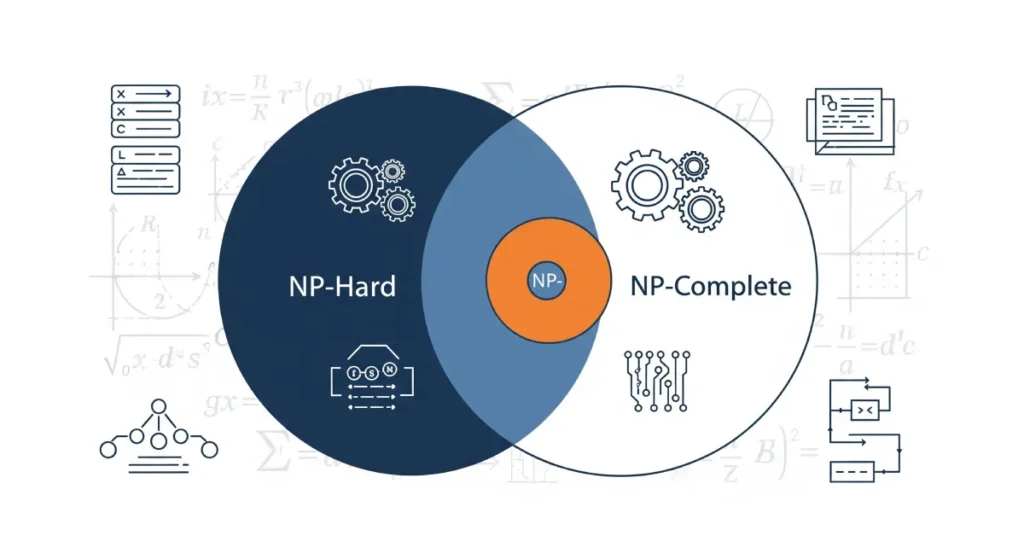
Complexity Classes Relationship
Understanding the Hierarchy
Complexity classes form a hierarchy that helps us categorize problems by their computational difficulty. Understanding where NP-Hard and NP-Complete fit within this hierarchy is essential for grasping their relationship and practical implications.
The Complexity Class Landscape
| Complexity Class | Definition | Relationship to NP-Hard/NP-Complete |
|---|---|---|
| P (Polynomial Time) | Problems solvable in polynomial time by a deterministic Turing machine | P ⊆ NP, but unknown if P = NP. If P = NP, then NP-Complete problems would be in P |
| NP (Nondeterministic Polynomial) | Problems verifiable in polynomial time by a non-deterministic Turing machine | NP-Complete is a subset of NP; NP-Hard may or may not intersect with NP |
| NP-Complete | Problems in NP that are as hard as any problem in NP | All NP-Complete problems are NP-Hard; the “hardest” problems in NP |
| NP-Hard | Problems at least as hard as the hardest problems in NP | Contains NP-Complete as a subset; may include problems outside NP |
Venn Diagram Relationship:
Imagine three regions:
- P: The innermost region containing all polynomial-time solvable problems
- NP: A larger region containing P plus all polynomial-time verifiable problems
- NP-Complete: A region within NP containing the hardest NP problems
- NP-Hard: A region that contains NP-Complete but extends beyond NP to include even harder problems
Real-World Examples
Common NP-Complete Problems
Classic NP-Complete Problems
- Boolean Satisfiability (SAT): The first problem proven NP-Complete by Cook’s theorem. Determines whether a Boolean formula has at least one assignment of truth values that makes the formula true
- Traveling Salesman Problem (Decision Version): Given cities and distances, does a route exist visiting each city exactly once with total distance ≤ k?
- Knapsack Problem (Decision Version): Can you select items with total value ≥ V while staying within weight limit W?
- Graph Coloring: Can a graph be colored with k colors such that no adjacent vertices share the same color?
- Hamiltonian Path: Does a graph contain a path visiting each vertex exactly once?
NP-Hard (But Not NP-Complete) Problems
- Traveling Salesman Problem (Optimization): Finding the actual shortest route (not just determining if one exists under a threshold)
- Halting Problem: Determining if a program will halt on a given input — this is undecidable, making it NP-Hard but not in NP
- Optimal Chess Play: Determining the optimal move from any chess position — game tree complexity makes this harder than NP
- Circuit Minimization: Finding the smallest circuit that computes a given Boolean function
- Protein Folding: Finding the minimum energy configuration of a protein structure
Real-World Applications
These examples show how NP-Hard and NP-Complete problems appear in practical applications across diverse fields: logistics and supply chain optimization (TSP), resource allocation and scheduling (Knapsack), network design and frequency assignment (Graph Coloring), computational biology (Protein Folding), compiler optimization (Circuit Minimization), and artificial intelligence (Game Playing). Understanding problem classification helps developers choose between exact algorithms for small instances, approximation algorithms for near-optimal solutions, or heuristic approaches for practical feasibility.
Practical Implications for Developers
When You Encounter These Problems
Recognize the Problem
First, identify if your problem is NP-Hard or NP-Complete. Look for characteristics like exponential solution space, optimization over combinations, or decision problems with no known polynomial algorithm.
Choose Your Strategy
For small inputs (n < 20), exact algorithms may work. For larger inputs, consider approximation algorithms (guaranteed bounds), heuristics (practical performance), or problem reformulation to avoid the hard parts.
Set Realistic Expectations
Communicate to stakeholders that optimal solutions may be impractical. Focus on “good enough” solutions that meet business requirements rather than theoretical perfection.
Solution Strategies
| Strategy | Best For | Trade-offs |
|---|---|---|
| Exact Algorithms | Small problem instances (typically n < 20-30) | Guaranteed optimal solution but exponential time complexity |
| Approximation Algorithms | Problems with proven approximation bounds | Polynomial time with guaranteed quality (e.g., within 2x of optimal) |
| Heuristics | Large instances requiring practical solutions | Fast and often good results but no optimality guarantee |
| Metaheuristics | Complex optimization with multiple objectives | Flexible and powerful but requires parameter tuning |
| Problem Reformulation | When structure allows simpler formulation | May change the problem slightly but gain tractability |
Developer’s Rule of Thumb
If you prove your problem is NP-Complete or NP-Hard, don’t waste time searching for a polynomial-time optimal algorithm. Instead, focus on practical approaches: exact algorithms for small instances, approximation algorithms with proven bounds, effective heuristics tested on representative data, or hybrid approaches combining multiple strategies. This pragmatic mindset saves development time and delivers better real-world results.
Frequently Asked Questions
Conclusion
Understanding the distinction between NP-Hard vs NP-Complete is crucial for grasping the complexity of computational problems. NP-Complete problems are the hardest problems within NP, characterized by their membership in NP and their universality — every NP problem reduces to them in polynomial time. NP-Hard problems encompass an even broader class, including everything at least as hard as NP-Complete problems, but without the requirement of being in NP themselves.
While computer scientists continue debating whether they can solve NP problems in polynomial time, the concepts of NP-Complete and NP-Hard help them categorize the difficulty of various computational tasks. This understanding enables developers and researchers to choose appropriate problem-solving strategies and set realistic expectations for algorithm performance.
Key Takeaways
- All NP-Complete problems are NP-Hard, but not all NP-Hard problems are NP-Complete
- NP-Complete problems must be in NP (verifiable in polynomial time), while NP-Hard problems have no such requirement
- Recognition saves time: Identifying these problem types guides you toward practical solutions rather than impossible perfection
- Multiple solution strategies exist: Exact algorithms for small instances, approximation algorithms with guarantees, and heuristics for practical performance
- P vs NP remains open: Whether NP-Complete problems have polynomial solutions is one of the greatest unsolved problems in mathematics
Whether you’re optimizing delivery routes, scheduling resources, analyzing complex systems, or building intelligent systems, recognizing these problem types will guide you toward the most effective approaches for your specific computational challenges. The distinction between NP-Hard and NP-Complete isn’t just theoretical — it has immediate practical implications for algorithm design, software architecture, and computational feasibility in real-world applications.
